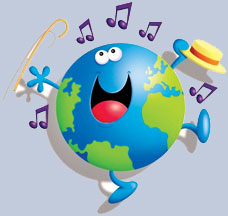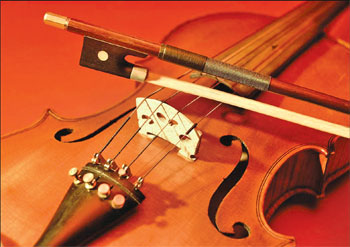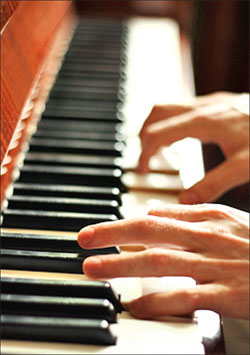|

Today is World Music Day :
Heart Talk
Aditha DISSANAYAKE
Remember the lullabies your mother sang when you were a toddler?
Remember listening to Pink Floyd as a teenager – especially to the song
Another Brick in the Wall? Later on, it was Brian Adams with his
Everything I do or Amaradeva and Adara Hangum, Clarence Wijewardena with
Loke Lassana wannata... But on days when nothing seemed to work right it
would surely have been Julie Andrews in The Sound of Music singing My
Favourite Things. What would life be without this language of the heart?
|
World Music Day
 Anyone can make music on World Music Day, in some cases in any
location, provided one rule is followed: The music must be free. Anyone can make music on World Music Day, in some cases in any
location, provided one rule is followed: The music must be free.
World Music Day originated in France, where since 1982 the Fête de la
Musique has taken place annually on June 21. The event consists of free
performances organized in parks, public squares, and indoor venues, as
well as unofficial concerts given along city streets.
Through its history, the event has gradually caught on
internationally, and a host of cities and countries worldwide now
observe the day either independently or with help from local French
consulates or cultural associations. What is now known internationally
as World Music Day is celebrated on June 21 (or the nearest weekend)
with free concerts and open participation in around 110 countries.
|
Unthinkable. Life without music would surely be worse than the Ice
Age. To most of us regardless of where we live, what language we speak,
music is an important part of our day to day existence. This is so
because music comes from within the heart and expresses the way we feel,
what we think, and especially, how we love in ways ordinary words can
never do.
Moreover, scientists believe singing, listening, and creating music
of any kind provide immediate biological and psychological benefits for
everyone. These include happiness, less stress, reduced depression,
increased competence, hope, and optimism. Losing yourself in the right
music is an immediate, unconscious and effortless way to change your
negative moods. Thus, when it comes to the healing powers of music, it
is both a salvation and an antidote.
Music, undoubtedly is also a means of communication. To quote from
Anthony Storr’s book, Music and the Mind - “some writers suggest that
music conveys the same meaning to different listeners more accurately
than a verbal message.”
Created by a composer, transmitted by an interpreter, heard and
recreated by the listeners in many different ways, no one can deny music
is a language, more expressive if possible, than language itself. As
Aldous Huxley said “Music expresses the inexpressible”.
What then, is preventing music from becoming a universal language?
“Everything” says Jayantha Aravinda, former Director of aesthetic
subjects of the Ministry of Education and the composer of music for most
of Prof. Ediriweera Sarachchandra’s plays, (Rathnavali, Maname,
Sinhabahu, Pemathi Jayathi Soko etc) as well as Henry Jayasena’s Thawath
Udasank to name only a few. This veteran musician who has studied music
in India as well as in Great Britain does not believe it is possible to
fuse two different traditions of music. “There are vast differences
between the Eastern and Western traditions” says Jayantha Aravinda. “The
Eastern tradition is melodic; you listen to one note at a time.
The Western tradition is harmonic; you listen, simultaneously to two
or more notes.” He does not believe it is possible to mix the two
together to form a genre called World Music. “When you fuse Eastern and
Western Music you end up with confusion” is how he explains this
phenomenon.
  He admits it is undeniable that music all over the world has twelve
notes but emphasizes that the “universality” of music from different
cultures ends here. “Music cannot be used as a universal language”
contends Jayantha Aravinda. “If your ears are not used to the music you
are listening to, what you understand of the message the music carries
will be insignificant.” He admits it is undeniable that music all over the world has twelve
notes but emphasizes that the “universality” of music from different
cultures ends here. “Music cannot be used as a universal language”
contends Jayantha Aravinda. “If your ears are not used to the music you
are listening to, what you understand of the message the music carries
will be insignificant.”
Is this true? I wonder. How many of us have listened to Tere Mere
Milan even though we do not understand Hindi, and instinctively
responded to the feelings conveyed through the music?
Researcher Thomas Fritz, from the Max Planck Institute for Human
Cognitive and Brain Sciences in Germany seems to have the answer. Fritz
and his team conducted an experiment with a group of 21 Mafa farmers in
Cameroon, Africa who said they had had no previous exposure to Western
music. They were exposed to 42 instrumental excerpts of Western music
with different tempos, pitch ranges and rhythms. The farmers were then
asked whether they thought each piece of music expressed happiness,
sadness, or fear and to point to photos of faces showing the relevant
expressions. The Mafa’s ability to correctly identify the emotion was
far greater than chance, picking the ‘happy’ music 60% of the time on
average and ‘sad’ and ‘fearful’ emotions about half the time. It could
most likely be that the Mafa were picking up on the same “tone of voice”
cues used in human speech, the study concluded.
Thus, as Jayantha Aravinda so rightly states, though music might not
be understood equally by each listener, it is undeniable that it does
not leave the listener totally unresponsive. Thus, even though we may
not have an appreciation of the culture from which it originates, music
surely offers us the opportunity to “feel” from deep within our hearts.
While we can never hope to communicate with everyone in the world,
perhaps music is the nearest we will ever get to a universal language;
because music speaks the language of the heart.
[email protected]
|



